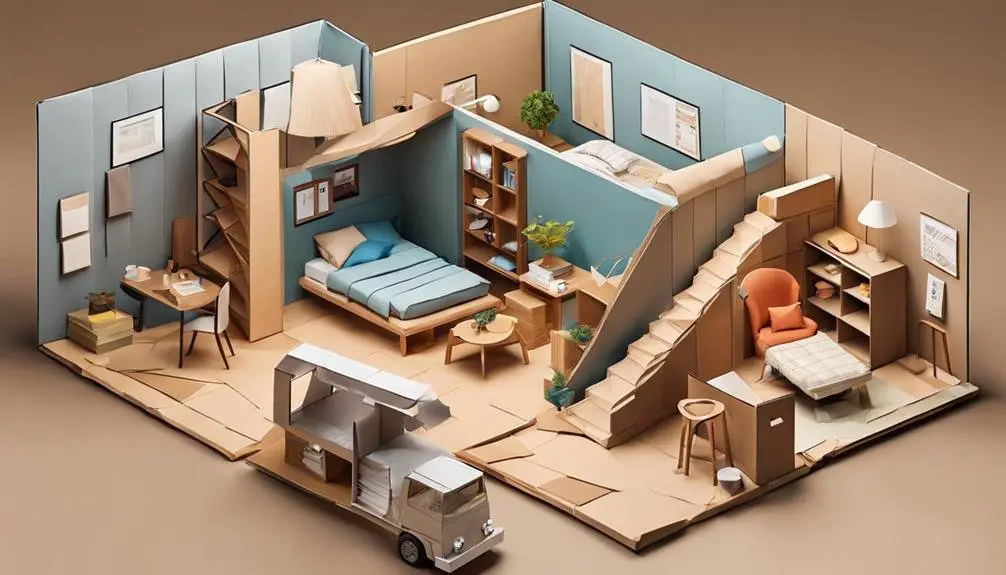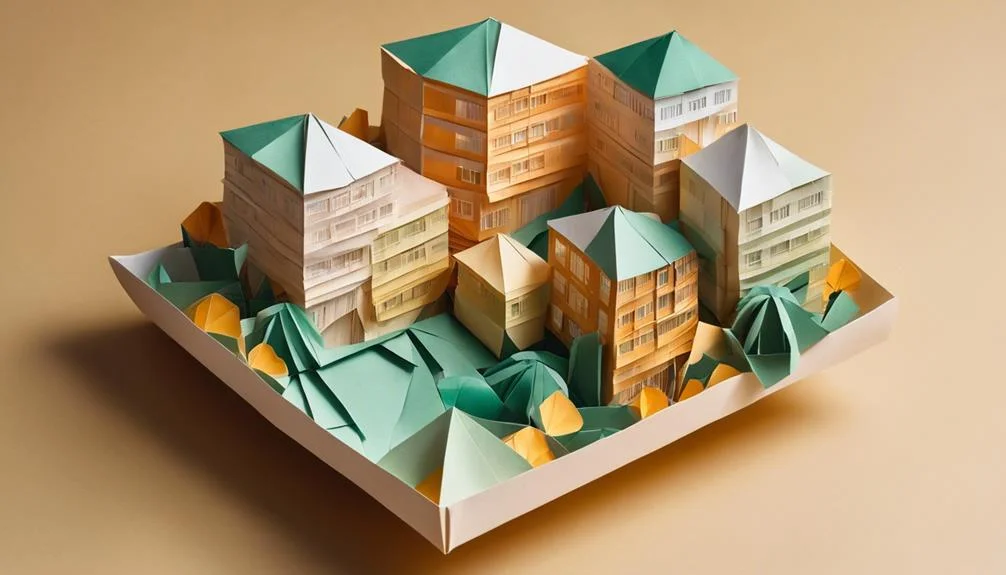The pros of living on the third floor of an apartment are increased privacy, security, stunning scenic views, and reduced exterior noise from streets. Heat rising can also mean a warmer living space during colder months, providing both comfort and potential heating cost savings.
The cons of living on the third floor of an apartment are limited emergency exits, and potential challenges with temperature regulation as heat rises. There’s also the inconvenience of stairs in buildings without elevators, and possibly higher costs for views.
Takeaways:
- 3rd floor apartments offer enhanced security and scenic views, improving aesthetics and personal space.
- Challenges include limited emergency evacuation options and potential temperature extremes.
- Without elevator access, daily activities and safety for residents with mobility issues are significantly impacted.
- Space optimization strategies like multi-functional furniture are essential for maximizing the living experience on higher floors.
| Pros of 3rd Floor Apartment | Cons of 3rd Floor Apartment |
|---|---|
| Increased privacy | Challenging evacuations |
| Enhanced security | Risk of temperature extremes |
| Scenic views | Inconvenience of stairs |
| Reduced noise pollution | Higher costs for views |
| Warmth in cooler months | Increased AC bills |
| Potentially lower rent | Water pressure issues |
| Easy roof access | Difficulty moving in/out |
| Encourages physical activity | Limited outdoor space |
| Better air quality | Noise from above |
| Indoor gardening opportunities | Less accessible for guests |
Pros of 3rd Floor Apartment
- Increased privacy: Living on the third floor generally offers more privacy than lower floors, as there’s less foot traffic passing by your windows. This can be particularly appealing for those who value their solitude and wish to keep a distance from the hustle and bustle on the street level.
- Enhanced security: Higher floors are often considered safer as they are more difficult to access from the outside, reducing the likelihood of break-ins. This added security can provide peace of mind to residents, knowing that their home is less accessible to potential intruders.
- Scenic views: Being on the third floor often affords better views compared to lower levels. Whether it’s a cityscape, a view of the surrounding nature, or just a more unobstructed view of the sky, this can enhance the living experience by offering beautiful vistas right from your window.
- Reduced noise pollution: The higher elevation of a third-floor apartment can significantly diminish noise from the street, such as traffic, pedestrians, and other urban sounds. This can create a more peaceful and quiet environment, conducive to relaxation and concentration.
- Warmth in cooler months: Since heat rises, third-floor apartments tend to be warmer in the colder months, which can lead to a more comfortable living environment and potentially reduce heating costs.
- Potentially lower rent: In buildings without elevators, third-floor apartments may have lower rent than those on lower floors due to the inconvenience of climbing stairs. This can make living in a desired location more affordable.
- Easy roof access: If the building allows, having easy access to the roof can be a bonus for activities such as sunbathing, enjoying panoramic views, or even small gatherings, assuming the roof is equipped and safe for such use.
- Encourages physical activity: The necessity of climbing stairs to reach a third-floor apartment can contribute to daily physical activity, promoting health and fitness without the need for a gym membership.
- Better air quality: Being further from the ground, third-floor apartments may enjoy better air quality with less dust and pollutants from cars and pedestrians, contributing to a healthier living environment.
- Opportunities for indoor gardening: With potentially more sunlight and less obstruction, the third floor can be ideal for indoor gardening, offering enough light for a variety of plants to thrive, which can enhance the apartment’s ambiance and air quality.
Cons of 3rd Floor Apartment
- Challenging evacuations: In the event of an emergency, evacuating from the third floor can be more challenging and time-consuming, especially in buildings without elevators, posing a potential risk in urgent situations.
- Risk of temperature extremes: Although heat rising can be beneficial in winter, it can lead to uncomfortably high temperatures in the summer, potentially increasing the reliance on air conditioning and associated costs.
- Inconvenience of stairs: In buildings without elevators, daily activities such as grocery shopping can become burdensome due to the need to climb stairs, which can be particularly challenging for individuals with mobility issues or after a long day of work.
- Higher costs for scenic views: While the views from a third-floor apartment can be a pro, they may also come with a higher rent price compared to apartments without such views, increasing the overall cost of living.
- Increased air conditioning bills: The warmer temperatures on the third floor during summer can lead to higher air conditioning usage and bills, offsetting any heating cost savings in the winter.
- Potential for water pressure issues: Being on a higher floor can sometimes result in lower water pressure, which can affect showers and other appliances, potentially leading to inconvenience and the need for adjustments or repairs.
- Difficulty moving in/out: Moving furniture and belongings in or out of a third-floor apartment can be particularly challenging and may require hiring professional movers, thereby increasing the cost and complexity of moving.
- Limited outdoor space: While roof access can be a pro, the lack of a personal outdoor space such as a balcony can be a con for those who enjoy gardening or outdoor relaxation within their own private area.
- Noise from above: Although reduced street noise is a benefit, living on the third floor can still subject residents to noise from neighbors above, if there are additional floors, which can be disruptive.
- Less accessible for guests: Visitors may find it less convenient to reach a third-floor apartment, especially elderly or disabled individuals, potentially affecting social gatherings and the ease of hosting events.
Benefits of 3rd Floor Apartment
Living on the third floor of an apartment building offers several distinct advantages, including enhanced security and a quieter, more private living environment. The elevated positioning significantly lowers the risk of break-ins, providing residents with peace of mind that their home is safer from potential intruders. This heightened security is a paramount benefit for many, ensuring a sense of safety within their living space.
Additionally, being removed from street level substantially reduces noise pollution from outside activities. This separation from the hustle and bustle of the streets below allows for a more peaceful and serene living environment, conducive to relaxation and focused work from home scenarios. The tranquility afforded by this elevation is a highly valued aspect for those seeking refuge from the city’s clamor.
The third floor also boasts an elevated view, offering scenic vistas that enhance the aesthetic appeal of the apartment. This perspective can provide not only visual pleasure but also a sense of openness and space, which is often lacking in urban environments. Moreover, the increased privacy and personal space on the third floor are significant. With fewer direct neighbors and less foot traffic, residents enjoy a more secluded and intimate atmosphere. Furthermore, the distance from the ground contributes to fewer pests and improved hygiene standards, adding to the overall quality of living in a third-floor apartment.
Negatives of 3rd Floor Apartment

While the advantages of residing on the third floor are numerous, it is essential to consider the drawbacks that come with such a choice. Living at this height can introduce several challenges that potential renters or buyers should be aware of before making their decision. These challenges range from daily inconveniences to potential safety concerns, all of which could significantly impact one’s living experience.
Here are four key downsides to living in a third-floor apartment:
- Inconvenient Stairs: Climbing stairs multiple times a day can be exhausting and time-consuming, particularly when carrying groceries, luggage, or navigating them with small children or after a long day at work.
- Temperature Extremes: The third floor may experience more pronounced temperature variations, becoming uncomfortably hot during summer and excessively cold in winter, which could lead to discomfort and higher energy bills.
- Limited Evacuation Options: In the event of an emergency, having fewer, and potentially more dangerous, routes for evacuation can pose significant safety risks.
- Noise Transmission: Despite being higher up, noise from neighboring units and street activities can still be a significant issue, potentially affecting sleep and overall peace.
Advantages of Elevated Living

Turning our focus to the advantages of living on the third floor, it is evident that such apartments offer distinct benefits.
Elevated living provides residents with panoramic views and an abundance of natural light, enhancing both the aesthetic appeal and the living experience.
Furthermore, these apartments typically experience less noise from the street and offer better security measures, contributing to a more serene and secure environment.
Enhanced View and Light
One of the most significant advantages of residing in a third-floor apartment is the enhanced natural light and panoramic views it offers, elevating the living experience by connecting residents more closely with their surroundings.
- Panoramic Views: The third floor’s elevated position offers unobstructed views of the environment, providing a sense of openness and a unique perspective that fosters a feeling of exclusivity and sophistication.
- Natural Light: The abundance of natural light not only creates a bright and airy atmosphere but also improves mood and productivity.
- Energy Efficiency: With more sunlight illuminating the space, there’s potential for cost savings on lighting and heating, contributing to a more energy-efficient living environment.
- Picturesque Sunrises and Sunsets: Enjoy the beauty of nature from the comfort of your home, with the privilege of witnessing stunning sunrises and sunsets.
Reduced Noise Disturbance
For many, the allure of residing on the third floor extends beyond the panoramic views, as it significantly reduces noise disturbances from both street-level activities and lower-floor neighbors, offering a more peaceful living environment. The increased height from the ground works as a buffer, effectively minimizing the intrusion of external noises into one’s living space. This advantage is particularly beneficial for those who value tranquility and privacy within their home. Elevated living thus not only enhances the quality of one’s living experience by creating a quieter atmosphere but also promotes a sense of serenity.
Residents of third-floor apartments can enjoy a calmer and more tranquil environment, free from the hustle and bustle that often accompanies lower-level living.
Improved Security Measures
In addition to the tranquility afforded by elevated living, third-floor apartments also offer the significant benefit of improved security measures, enhancing residents’ safety and peace of mind. This aspect of apartment living is crucial for those prioritizing their security and looking for a safer housing option. Here’s how elevated living contributes to a more secure environment:
- Increased Security: Lower risk of break-ins compared to ground-level units.
- Enhanced Privacy: Reduced chances of theft or vandalism due to less access.
- Deterrent Effect: The height of the third floor acts as a deterrent to potential intruders.
- Sense of Security: Residents typically experience a greater sense of security and peace of mind, knowing their living environment offers additional protection.
Challenges of Higher Floors

While living on higher floors offers unique advantages, it also introduces specific challenges, particularly for individuals with mobility issues or disabilities. For those residing on these levels, the necessity of navigating stairs can be a significant obstacle. This challenge might necessitate the installation of costly accessibility modifications, such as stairlifts, to ensure safe and comfortable access to their homes. Furthermore, emergency situations pose an increased risk for residents on higher floors. Evacuating promptly and safely during emergencies, such as fires or natural disasters, becomes more complex and potentially hazardous.
The need for additional accessibility features, like wider doorways and grab bars, is also more pronounced on higher floors. Implementing these modifications not only incurs significant expenses but may also require permission from building management or homeowners’ associations, complicating the process further. Consequently, these accessibility issues can profoundly affect daily routines, necessitating careful planning and consideration to ensure both safety and convenience for residents with mobility challenges. Addressing these concerns is essential for creating an inclusive and accessible living environment for all.
Mobility Considerations

When considering a third-floor apartment, it is crucial to address mobility considerations for individuals with disabilities or those who may find climbing stairs challenging. Elevator availability, staircase accessibility, and emergency evacuation protocols are pivotal factors that can significantly impact the daily lives and safety of residents with mobility concerns.
These aspects necessitate careful evaluation to ensure the accommodation aligns with the needs and well-being of all potential occupants.
Elevator Availability
Elevator availability is a crucial aspect for individuals with mobility issues considering residency in a third-floor apartment. For those with disabilities or limited mobility, the presence or absence of an elevator can significantly impact their living experience.
- Accessibility Challenges: Lack of elevator access can pose serious challenges for residents with mobility issues, making daily activities difficult.
- Cost Considerations: Installing a stairlift or making other accessibility modifications in the absence of an elevator can be prohibitively expensive.
- Emergency Situations: In emergencies, those with mobility issues may find themselves stranded without elevator assistance.
- Apartment Modifications: Necessary modifications for accessibility, such as wider doorways and grab bars, may pose additional challenges in third-floor apartments without elevator access.
Staircase Accessibility
Building upon the discussion of elevator availability, it is equally important to consider the accessibility of staircases for those residing on the third floor. Staircase accessibility can present significant challenges for individuals with mobility issues or disabilities, making daily life and routines more difficult.
While modifications such as stairlifts or making buildings wheelchair-accessible can provide solutions, these adaptations often come with high costs that third-floor residents must bear. Additionally, the need for wider doorways and grab bars to enhance accessibility could necessitate further modifications to the building’s structure, adding to the expense and complexity of living on the third floor.
The cumulative effect is that residents may experience longer access times, which can impact their convenience and overall quality of life.
Emergency Evacuation Concerns
Among the critical considerations for residents living on the third floor, emergency evacuation poses a significant challenge, particularly for individuals with mobility impairments. The urgency of safely evacuating a building during emergencies, such as fires or natural disasters, becomes complicated by several factors, including:
- Mobility Challenges: Residents with mobility issues may find navigating stairs difficult, if not impossible, during emergencies.
- Stair Obstacles: Stairs can significantly hinder quick and safe evacuations, especially impacting elderly residents or those with disabilities.
- Elevator Access: The absence of elevator service on the third floor can delay or prevent swift evacuations during crises.
- Alternative Routes: The necessity for planning alternative escape routes and ensuring assistance for those with mobility limitations is paramount to enhance safety during emergency evacuations.
Maximizing Your Space

Maximizing space in a third-floor apartment necessitates creative and efficient use of both furniture and storage solutions. Residents can significantly enhance the functionality and appearance of their limited space by selecting multi-functional furniture. For example, a bed with drawers underneath or a coffee table that doubles as a storage unit can provide much-needed storage space without occupying additional square footage. Incorporating mirrors strategically throughout the apartment can also create an illusion of more space, making the area feel larger and more open. Additionally, adding pops of color through decor can invigorate the space, contributing to a more expansive feel.
To further optimize space, installing wall-mounted shelves offers an elegant solution for keeping books, plants, and other decorative items without cluttering the floor. Under-bed storage containers are an excellent way to utilize often overlooked storage spaces, ideal for seasonal clothing or extra bedding. For even more creative storage solutions, consider using ottomans with hidden compartments for dual functionality or hanging organizers to keep essentials accessible yet out of the way. Lastly, making use of vertical space by installing tall bookshelves or storage units can dramatically increase the apartment’s storage capacity, ensuring every inch of the space is efficiently utilized.
Making Your Decision

When considering the move to a third-floor apartment, it’s essential to weigh the unique mix of benefits and drawbacks to determine if it aligns with your lifestyle and preferences. The decision to opt for a third-floor apartment involves careful consideration of various factors that can significantly impact your daily living experience. Here is a concise breakdown to guide you through your decision-making process:
- Privacy and Views: Third-floor apartments often offer increased privacy and better views of the surrounding area, making them desirable for those who cherish solitude and scenic outlooks.
- Quiet Living Environment: The distance from street-level noise and fewer adjacent neighbors contribute to a quieter living environment, conducive to relaxation and focus.
- Challenges of Accessibility and Safety: The need to navigate stairs may pose a challenge for moving heavy items, and in case of emergencies, evacuation options may be limited.
- Cost Considerations: While third-floor apartments may have higher rent and utility costs, they also offer advantages in ventilation, natural light, and energy efficiency that could offset these expenses over time.
Ultimately, your decision should reflect a balance between these considerations and your personal priorities, ensuring that your chosen apartment truly feels like home.
Conclusion
In conclusion, residing in a third-floor apartment offers a blend of advantages such as enhanced views, privacy, security, and environmental benefits.
However, it also presents challenges including mobility issues and potential difficulties in emergency situations. Effective space utilization and careful consideration of personal needs are essential for optimizing the living experience in such apartments.
Ultimately, the decision to opt for a third-floor residence requires a balanced evaluation of its benefits against the inherent drawbacks, tailored to individual lifestyles and priorities.










